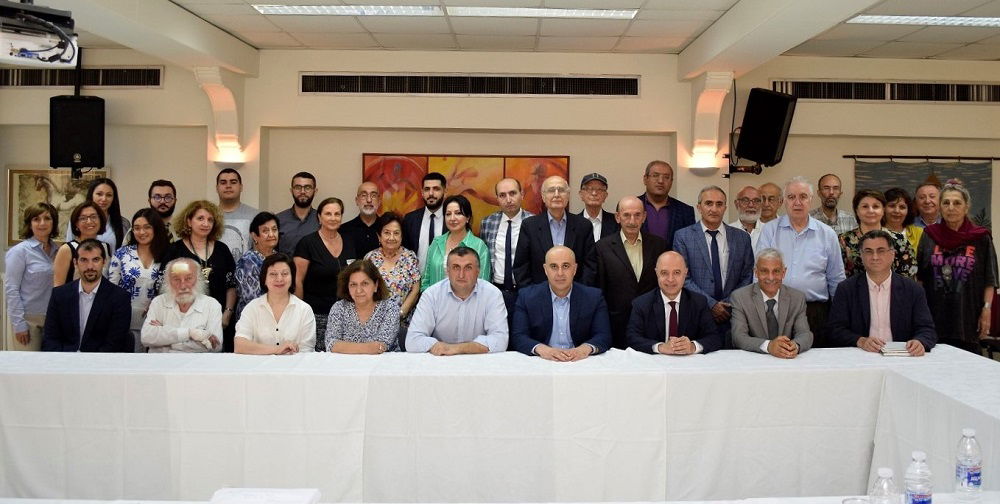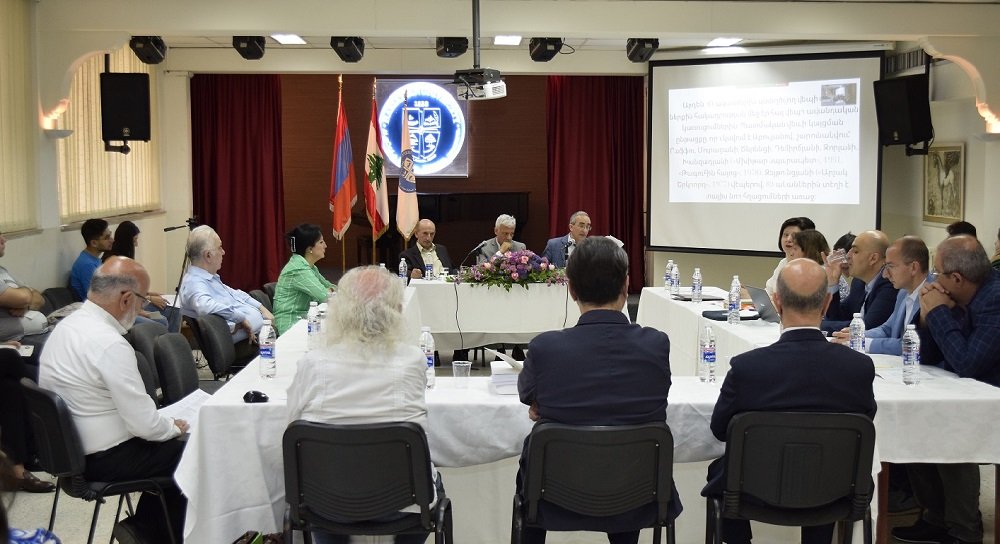
BEIRUT—The Armenian Diaspora Research Center (ADRC) at Haigazian University organized the second conference on “Transitions and Transformations in the Armenian Space: 1900-2020,” held from June 27-29, in collaboration with the Khatchadur Apovian State Pedagogical University in Armenia (SPUA).
In his opening remarks, ADRC director Dr. Antranik Dakessian welcomed the audience and noted that the conference “is a call to the researchers in the diverse fields of Armenian Studies to observe and discuss anew the last 120 years of the Armenians from the perspective of the proclamation of the republics of Armenia and Artsakh.” Dr. Dakessian called on the researchers to suggest roadmaps from the standpoint of the thirty years of Armenian statehood in order for the Armenians to follow a new path.
Due to the illegal Azeri blockade, Elina Mekhitarian from Artsakh could not join the conference in person. Nonetheless, she sent a short message to the conferees stating that the Azeri violation of basic human rights is intended to force the indigenous Artsakh Armenians to desert their homeland. “…the 1988 Artsakh self-determination struggle and the victory of the first Artsakh War brought back Armenian pride. However, we all lost the 2020 war,” stated Mekhitarian. “The Diaspora Armenians who were the victims of the Genocide more than anyone else live and understand the pain of the loss of land.” Mekhitarian called on Armenians to eradicate “complacency, indifference otherwise we will reach a stage of no return. The danger of losing Armenian statehood and of the annihilation of the Armenians forces us to act without any delay. Artsakh is the deterring factor; it is the first domino to fall. I call you, to salvage Artsakh.”
In the salutary message of the Rector of SPUA, Professor Serpuhi Kevorkian (read by Dr. Edgar Hivhannissian), the Rector noted that the topics raised not only academic interests but proposed practical resolutions to basic issues concerning the Armenian church, as well as to issues related to Armenian socio-political institutions, Armenian culture, identity, world perception, Armenian Genocide and Armenian statehood. The message went on to say that the study and assessment of these topics are both modern and important and expressed the hope that such a discussion will enable us to be better prepared for the coming transformations.
In his lecture entitled “The periods of Armenian transformations,” guest speaker Professor Khatchadur Stepanyan divided the Armenian transformation process into three different periods and presented the social, linguistic, cultural, and other aspects of these transformations.
In his closing comments, Haigazian University President Rev. Dr. Paul Haidostian asked, “Whose task is it to crystallize such a strategy in both our conditions – statelessness and having a state – a strategy that would contribute to Armenian safety and security, national, educational, military, linguistic, ethical, religious, economic, cyber, environmental and other fields?” Rev. Dr. Haidostian noted that “in the broad span of the Diaspora it is essential that these strategies involve a historic, scientific, political, diplomatic and cultural depth and go far beyond Yerevan and regulate Armenian existence.”
During the course of the conference, there were 17 presentations. These included Prof. Vatchagan Krikorian’s analysis of transformations of 20th century Armenian prose; Dr. Hagop Cholakian’s in-depth analysis of the transformations of the Western Armenian language; Prof. Claude Armen Mutafian narrated the transformation of the Carpathian Armenians since the 1900s; Prof. Vahram Shemmassian (via internet) discussed the transformations of the Musa Dagh Armenians, while Dr. Lusié Sahagian discussed those of the Hamshen Armenians; Dr. Garen Megerdchian and Dr. Ani Fishenkjian highlighted the transformation of the Iranian and Syrian Armenian communities, respectively; Rev. Dr. Haidostian focused on the transformation of the Armenian Evangelical Church; Dr. Hratch Chilingirian discussed the institutional secularization of the Armenian church; Dr. Raffi Cherchian examined transformations in Armenian church architecture; and Dr. Hovhannissian highlighted the transformation of the Catholicosate of Cilicia between the Genocide and the 1930s.
Additionally, Dr. Lilit Hovhannissian spoke about the transformation of the interpretations of the diplomatic history of the Armenian cause between 1878 and 1923 in Soviet and post-Soviet Armenian historiography; Vilen Mnatsakanian detailed the transformation of economic policy during state-planned and market-run economies; Dr. Khatchig Mouradian delved deeply into the transformation of genocide education from past to present and presented its future prospects; Dr. Hagop Tatevossian analyzed the socio-psychological transformation of patriotism and its expressions; Harout Sassounian discussed the transformations of Diaspora representations and the project of a Diaspora parliament; and Dikran Yegavian examined the transformations of the relations between the Republic of Armenia and the Diaspora.
During the second day of the conference, Professor Mutafian’s book Jérusalem et les Arméniens jusqu’à la conquête ottomane (1516) was launched. Dr. Dakessian highlighted the scholar’s legacy while Prof. Mutafian highlighted the main aspects of the Jerusalem Armenians until the Ottoman conquest in 1516.
Sessions were moderated by Drs. Vatchagan Krikorian and Armen Urneshlian, Mouradian, Dakessian, Hovhannissian, Stepanyan, and Yeghia Tashjian.
Each panelist was given 30 minutes to thoroughly examine their subject, analyze it and offer propositions. There were significant parallels in the conference between the Musa Dagh, Hamshen, Carpathian Armenian communities, as well as the Armenian communities of Iran and Syria. The papers on literature and language were of a panoramic nature; some papers had institutional perspectives, particularly those of the church.

Others that dealt with patriotism, historical interpretation and architecture were of a conceptual nature. An important novelty was papers that focused on economy and psychology, which added further perspectives to the conference and made it more inclusive. The papers on the governance-representation and cooperation of the Armenia-Artsakh-Diaspora triad and their visionary forecasts were of great importance.
This was an unprecedented conference, where the purpose was to focus on the last 120 years of Armenian life, to analyze it, examine current problems and come up with recommendations for the future, always keeping in mind the fact of Armenian statehood.
Misunderstandings and misinterpretations surfaced between Diaspora and Armenia scholars, as well as the conflict between the young and old generations’ approaches, particularly about the running and governance of the Armenian space, the imperative to plan for the future and come up with resolutions. Nonetheless, the conference distinguished itself by its free, friendly, academic atmosphere, where diverse perceptions, approaches, generations and disciplines were exhibited. It was another step towards disseminating awareness and involving a broader audience.
This was the second conference of its kind; the previous conference was held in Yerevan at SPUA on June 29-30, 2022. This second conference made clearer the scope of research in the Armenian space and will become the springboard to the third conference, which will be more focus-oriented and should deal with procedural matters, issues of applicability and policy adoptions for a better Armenian future.



Be the first to comment